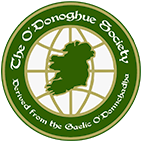John O’Donohue is a Catholic scholar born in Caherbeanna near Blackhead, in the Burren in County Clare.
A former Catholic priest, O’Donohue weaves together various strands of wisdom, including European philosophy (he’s a Hegelian scholar), Christian mysticism, and the deep native spirituality and mythology of the Celtic lands, to create lyrical insights into the role of spirituality – especially Celtic spirituality – in a world dominated by media, technology, and the gods of the shopping mall.
How does he equate Celtic spirituality with his Catholic faith?
"Celtic spirituality has many things that I think modern culture is crying out for," explains O’Donohue. "It considers nature to be the theatre of divine presence and activity. It has a lovely understanding of the nearness, the adjacency of the other world… with Catholicism I suppose, there would be a natural clash there. But I think that one of the fascinating things about Celtic spirituality is that it retrieves for Christianity something that it had lost."
O’Donohue does not ponder on his decision to leave the Church. It was just the right time to do so, he says.
"Christianity, when it took over some elements of Greek philosophy, took over a lot of dualism, which separated mind and spirit, mind and body, person and nature, human and divine, masculine and feminine. In some strange, intuitive way, Celtic spirituality thought of these things in the same way, without separating them off from each other."
"Anything that is separated, in the realm of mind and psyche, becomes inevitably an agent of the destructive – toxic. In Ireland it’s very interesting that the conversation between Celtic spirituality and Christian spirituality was mediated in such a way that each took from the other what they required. So that in the Irish psyche, in some deep way, that resolution and reconciliation has already occurred."
Millions around the world have tapped into O’Donohue’s train of thought and Australia is no exception it seems.
"I had about 700 people come to see me talk in Melbourne, and I heard that they had to turn 500 people away – that’s an awful lot of people," acknowledges John.
Place and location are central ideas in O’Donohue’s work. Yet he also believes in a form of spiritual "ancestry" within the psyche that, he muses, may be where Celtic heritage "pops up".
Those who were not brought up in Ireland, but have background, "they’re still attached and it’s almost like an extension of tissue," says John drawing out a long imaginary thread with his hands.
O’Donohue’s latest work is a book of poetry called Conamara Blues. Poetry and lyricism are central to O’Donohue’s non-fiction work.
"The most challenging writing for me is poetry. I think poems are incredibly hard to create, and they’re very slow. But I think they are the ultimate linguistic object. A poem invites you into it, to have the experience in your own kind of way. In a poem you can have a conversation with yourself in a way you never can have with prose, unknown things about yourself slip out."
Consistent with his belief that the natural environment is a significant spiritual resource, O’Donohue has been Chairperson of the Burren Action Group for the past 11 years. The group actively opposes development of the area including the contentious interpretive centre.
"We are children of nature, and anytime my mind is dulled, I go to the ocean or the mountains. I always find my way to them. The German poet Rilke said that in times of complexity and trauma, always try to be close to one simple thing in nature.
"I think one of the things that happens when a culture gets obsessed with economics is that there is a lost connection with nature, and abuse of nature… I think that the huge achievement of the corporate market was to put the most subversive generation – adolescents – into uniform. Parents can’t do it, teachers can’t do it, but brand names can…the recovery of individuality is a duty and responsibility. I think that the majority, who are usually silent, if we’re going to reclaim our world – especially the environment, are going to have to speak. Truth is a powerful thing."
